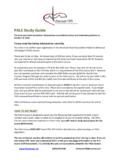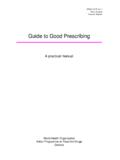Transcription of BRIEF INTERVENTION FBRIEF INTERVENTION FOR …
1 BRIEF INTERVENTION FBRIEF INTERVENTION FBRIEF INTERVENTION FBRIEF INTERVENTION FOR SUBSTANCE USE: OR SUBSTANCE USE: OR SUBSTANCE USE: OR SUBSTANCE USE: A manual FOR USE IN A manual FOR USE IN A manual FOR USE IN A manual FOR USE IN PRIMARY CARE PRIMARY CARE PRIMARY CARE PRIMARY CARE Draft Version for Field Testing Department of Mental Health and Substance Dependence World Health Organization Caveat relating to use of this Caveat relating to use of this Caveat relating to use of this Caveat relating to use of this documentdocumentdocumentdocument This document was written by Sue Henry-Edwards, Rachel Humeniuk, Robert Ali.
2 Maristela Monteiro and Vladimir Poznyak and is currently available for use in unpublished draft form only. Copies of this document are available on the WHO website for clinical and/or research purposes and should be referenced accordingly. Revisions and changes to this document may occur prior to formal publication. Formal publication of this document by the World Health Organization is anticipated to occur by 2005. Suggested reference: Sue Henry-Edwards, Rachel Humeniuk, Robert Ali, Maristela Monteiro and Vladimir Poznyak. BRIEF INTERVENTION for Substance Use: A manual for Use in Primary Care.
3 (Draft Version for Field Testing). Geneva, World Health Organization, 2003. This draft document is complemented by: This draft document is complemented by: This draft document is complemented by: This draft document is complemented by: Sue Henry-Edwards, Rachel Humeniuk, Robert Ali, Vladimir Poznyak and Maristela Monteiro. The Alcohol, Smoking and Substance Involvement Screening Test (ASSIST): Guidelines for Use in Primary Care (Draft Version for Field Testing). Geneva, World Health Organization, 2003. Rachel Humeniuk, Sue Henry-Edwards and Robert Ali.
4 Self-Help Strategies for Cutting Down or Stopping Substance Use: A Guide. (Draft Version for Field Testing). Geneva, World Health Organization, 2003. AcknowledgementsAcknowledgementsAcknowle dgementsAcknowledgements This draft is based on the data and experience obtained during the participation of the authors in the WHO Alcohol, Smoking and Substance Involvement Screening Test (WHO ASSIST) Project Phase III, coordinated and sponsored by the World Health Organization and implemented by the WHO ASSIST Phase III Working Group, that includes.
5 ROBERT ALI (AUSTRALIA) THOMAS BABOR (USA) MICHAEL FARRELL (UK) MARIA LUCIA FORMIGONI (BRAZIL) RACHEL HUMENIUK (AUSTRALIA) JAROON JITTIWUTIKARN (THAILAND) ROSELI BOERNGEN DE LACERDA (BRAZIL) WALTER LING (USA) JOHN MARSDEN (UK) JOSE MARTINEZ-RAGA (SPAIN) BONNIE MCREE (USA) MARISTELA MONTEIRO (WHO) DAVID NEWCOMBE (AUSTRALIA) HEMRAJ PAL (INDIA) VLADIMIR POZNYAK (WHO) SARA SIMON (USA) JANICE VENDETTI (USA) The preparation of this document was coordinated by Vladimir Poznyak and Maristela Monteiro from the WHO Department of Mental Health and Substance Dependence and Rachel Humeniuk and Robert Ali from Clinical Policy and Research Division, Drug and Alcohol Services Council, Parkside, WHO Collaborating Centre for Research in the Treatment of Drug and Alcohol Problems (Australia).
6 Partial financial support for participation of the WHO Collaborating Centre for Research in the Treatment of Drug and Alcohol Problems in the WHO ASSIST Phase III Study was provided by the Australian Commonwealth Department of Health and Aging. Graphics and layout were provided by Momcilo Orlovic from the World Health Organization. Opportunity for feedbackOpportunity for feedbackOpportunity for feedbackOpportunity for feedback We invite your comments and feedback. We are particularly interested in your experiences in using this document and its usefulness and relevance in your clinical, or other, setting.
7 If you have any feedback, comments, queries relating to this document please contact: Dr Rachel Humeniuk Senior Project Manager World Health Organisation Collaborating Centre for Research in the Treatment of Drug and Alcohol Problems Department of Clinical & Experimental Pharmacology University of Adelaide South Australia 5005 +61-8-8303 8056 (Phone) +61-8-8303 8059 (Fax) Dr Vladimir Poznyak Management of Substance Dependence (MSB), Department of Mental Health & Substance Dependence (MSD) World Health Organization 20 Avenue Appia 1211 Geneva 27, Switzerland +41-22-791 48 51 (Fax)
8 World Health Organization World Health Organization World Health Organization World Health Organization This document is not a formal publication of the World Health Organization (WHO), and all rights are reserved by the Organization. The document may, however, be freely reviewed, abstracted, reproduced, and translated, in part or in whole but it may not be sold or used in conjunction with commercial purposes. Inquiries should be addressed to the Department of Mental Health and Substance Dependence, World Health Organization, CH-1211 Geneva 27, Switzerland, which will be glad to provide latest information on any changes made to the text, regional adaptations and translations that are already available.
9 The authors alone are responsible for the views expressed in this document, which are not necessarily those of the World Health Organization. BRIEF INTERVENTION FOR PROBLEMATIC SUBSTANCE USE: GUIDELINES FOR USE IN PRIMARY CARE. DRAFT VERSION ONLY SEPTEMBER 2003 3 TABLE OF CONTENTS 1. What is a BRIEF INTERVENTION ? .. 4 2. Nature and purpose of this 4 3. Rationale for BRIEF INTERVENTION in Primary Care .. 5 4. Model of behaviour 6 Stage 1 Not really thinking about changing (Pre-contemplation).. 7 Stage 2 Thinking about cutting down or stopping substance use (Contemplation).
10 7 Stage 3 Doing something about changing their behaviour (Action) .. 9 Stage 4 Keeping on with the new behaviour (Maintenance) .. 9 Relapse .. 9 Ready, willing and able .. 9 5. Components of BRIEF interventions that 11 11 6. Motivational Interviewing .. 12 Principles of motivational 12 Specific skills .. 13 7. Screening and BRIEF INTERVENTION .. 16 Screening .. 16 Linking Screening to Appropriate Interventions .. 16 Feedback of ASSIST Results .. 18 Feedback and information for low risk users .. 18 BRIEF INTERVENTION with moderate risk 19 8.














